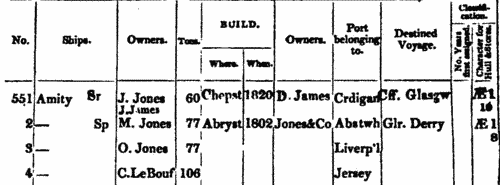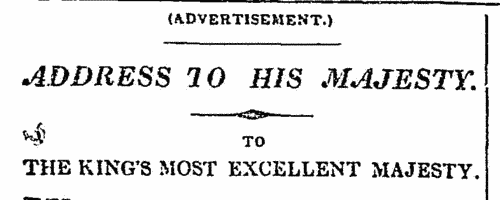Lusk Surname Ancestry ResultsOur indexes 1000-1999 include entries for the spelling 'lusk'. In the period you have requested, we have the following 65 records (displaying 11 to 20): Single Surname Subscription | | | Buying all 65 results of this search individually would cost £360.00. But you can have free access to all 65 records for a year, to view, to save and print, for £100. Save £260.00. More... |
These sample scans are from the original record. You will get scans of the full pages or articles where the surname you searched for has been found. Your web browser may prevent the sample windows from opening; in this case please change your browser settings to allow pop-up windows from this site. Masters of British Merchantmen
(1834)
Lloyd's Register of British and Foreign Shipping was established in 1834, following the demise of two earlier societies for registering shipping in Britain. The new register in 1834 was created from an alphabetical list of British ships with no more detail than name, master's name, tonnage, and port to which they belonged. Lloyd's insurance syndicate provided £1000 for the establishment of a new system of surveyors, and as the year progressed many of the entries in the register were then annotated with additional information - type of vessel (Bk, barque; Bg, brig; Cr, cutter; Dr, dogger; G, galliott; H, hoy; K, ketch; Lr, lugger; S, ship; Sk, smack; Sp, sloop; Sr, schooner; St, schoot; Sw, snow; Yt, yacht), place and year of build, owners, destined voyage, and classification of the vessel and its stores, with the month (indicated by the final number in the last column) of inspection. Underneath each of these amended entries details were given of construction and repair, with year - s., sheathed; d., doubled; C., coppered; I. B., iron bolts; s. M., sheathed with marine metal; s. Y. M., sheathed with yellow metal; F., felt; PH., patent hair; Cl., clincher; len., lengthened; lrp., large repairs; trp., thorough repairs; ND., new deck; M. TSds., new top-sides; W. C., wales cased; NW., new wales; Srprs, some repairs - and, in italics, the timber of the ship is described - B. B., black birch; Bh, beech; C., cedar; E., elm; F., fir; G., gum; Ght., greenheart; Hk., hackmatack; L., locust; L. O., live oak; P., pine; P. P., pitch pine; R. P., red pine; Y. P., yellow pine; S., spruce; T., teak; W. O., white oak. The sample scan is from the main list. The third column, reserved for masters' names, is not particularly wide; with short surnames, an initial will be given; but longer surnames omit the initials, and even longer surnames are abbreviated. This is the index to masters in the main list. Often new masters had been appointed by the time of survey, and their names are added in slightly smaller type under the original master's names in the third column. These new masters are also included in this index.LUSK. Cost: £6.00.  | Sample scan, click to enlarge

| Merchants, Bankers, Shipowners and Traders of London
(1834)
The public prints of December 1834 carried this loyal address to king William IV of merchants, bankers, shipowners, traders and others connected with the city of London, requesting 'permission at the present juncture to address your Majesty for the purpose of renewing the expression of our dutiful and loyal attachment to your Majesty’s person and crown. Deeply sensible of the practical blessings we have hitherto enjoyed under our wisely mixed constitution of King, Lords, and Commons, and feeling that the free and legitimate exercise of the Royal prerogative forms an integral part of that constitution (as essential to the maintenance of our own liberties as to the power and dignity of the Throne), we beg humbly to assure your Majesty of our determination steadfastly to uphold the same by every means in our power.
'Feeling, in common with all classes of your Majesty’s subjects, the deep importance of applying to all real abuses, wherever they may be found, a wholesome and timely correction, and of effecting in our excellent institutions every improvement of which careful examination and experience may prove them to be susceptible, we desire further dutifully to express our entire confidence that these useful purposes will ever occupy your Majesty’s paternal care. Nor can we permit ourselves to believe that the importance of these objects will be less apparent to those to whom the powers of government have been recently intrusted.'
Full names are given (or surname with initials), and address. Over 5000 subscribed.
LUSK. Cost: £6.00.  | Sample scan, click to enlarge

| Scottish Bankrupts
(1841)
Scotch Sequestrations: bankruptcy often caused people to restart their lives elsewhere, so these are an important source for lost links
LUSK. Cost: £6.00.  | Sample scan, click to enlarge

| Scottish Bankrupts
(1842)
Scotch Sequestrations: bankruptcy often caused people to restart their lives elsewhere, so these are an important source for lost links
LUSK. Cost: £6.00.  | Sample scan, click to enlarge

| Insolvents in Ireland
(1845)
Perry's Bankrupt and Insolvent Gazette, issued monthly, included lists of insolvencies and stages in the process whereby the insolvents petitioned for release from debtors' prison. The insolvent is generally referred to by name (surname first), address and trade. This is the index to the names of Irish insolvents, from the issues from January to December 1845.LUSK. Cost: £6.00.  | Sample scan, click to enlarge

| Deaths, Marriages, News and Promotions
(1850)
Death notices and obituaries, marriage and birth notices, civil and military promotions, clerical preferments and domestic occurrences, as reported in the Gentleman's Magazine. Mostly from England and Wales, but items from Ireland, Scotland and abroad.
LUSK. Cost: £4.00.  | Sample scan, click to enlarge

| Traders and professionals in London
(1851)
The Post Office London Directory for 1851 includes this 'Commercial and Professional Directory', recording about 80,000 individuals. LUSK. Cost: £4.00.  | Sample scan, click to enlarge

| Traders and professionals in London
(1856)
The Post Office London Directory for 1856 includes this 'Commercial and Professional Directory', recording over 100,000 individuals. LUSK. Cost: £4.00.  | Sample scan, click to enlarge

|  Persons of standing recommending London police recruits
(1843-1857) Persons of standing recommending London police recruits
(1843-1857)
The Metropolitan Police Register of Joiners (MEPO 4/334) lists policemen joining the force 1 January 1843 to 1 April 1857 (warrant numbers 19893 to 35804). The register is alphabetical, in so far as the recruits are listed chronologically grouped under first letter of surname. It gives Date of Appointment, Name, Number of Warrant, Cause of Removal from Force (resigned, dismissed, promoted or died), and Date of Removal. Although the register was closed for new entrants at the end of 1842, the details of removals were always recorded, some being twenty or more years later. Those recruits not formerly in the police, the army, or some government department, were required to provide (normally) at least two letters of recommendation from persons of standing, and details of these are entered on the facing pages. Where a recruit was only recently arrived in the metropolis, the names and addresses of the recommenders can be invaluable for tracing where he came from. Those recruits not formerly in the police, the army, or some government department, were required to provide (normally) at least two letters of recommendation from persons of standing, and details of these are entered on the facing pages: the names in these are indexed here (the police recruits are indexed separately and not included here). Recruits transferred from other forces or rejoining the force did not normally need recommendations - in the latter case, former warrant numbers are given - but some recommendations are from police inspectors, even other constables. Recruits coming from the army sometimes have general military certificates of good conduct, but most often have a letter from their former commanding officer; recruits recommended by government departments (most often the Home Office) similarly have letters from the head of department. But the great majority of the names and addresses in these pages are of respectable citizens having some sort of personal acquaintance with the recruit. Where more than two recommendations were provided, the clerk would only record one or two, with the words 'and others'. Tradesmen are sometimes identified as such by their occupations; there are some gentry. Although the bulk of these names are from London and the home counties, a scattering are from further afield throughout Britain and Ireland. LUSK. Cost: £8.00.  | Sample scan, click to enlarge

|  British infantry fighting in China
(1858-1860) British infantry fighting in China
(1858-1860)
The China Medal was awarded to soldiers and sailors who took part in the prosecution of the war against the Chinese from 1856 to 1860. Separate clasps were awarded for men who had been in receipt of the China Medal of 1842; for being actually present at Canton on 28 and 29 December 1857, when that city was bombarded and finally captured; for being actually engaged in the operations which ceased with the first capture of the Taku Forts, 20 May 1858, and led to the Treaty of Tientsin; for being actually present at the capture of the Taku Forts 21 August 1860; and for being actually present before Pekin the day the gate of that city was given up to the allied (British and French) army, viz. on 13 October 1860. The 2nd battalion, the 1st (The Royal) Regiment of Foot, based at Birr, left Ireland for Cephalonia 31 January 1853. After fighting in the Crimea, the battalion was moved to Malta, then to Gibraltar; was transferred from Gibraltar to China in 1858; and did not return to England until 1861. The battalion took part in the capture of the Taku Forts and that of Pekin.LUSK. Cost: £8.00.  | Sample scan, click to enlarge

|
Research your ancestry, family history, genealogy and one-name study by direct access to original records and archives indexed by surname.
|













